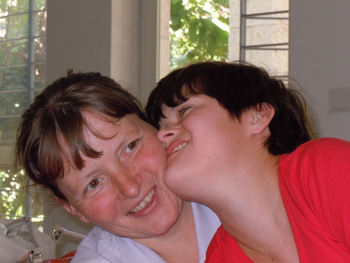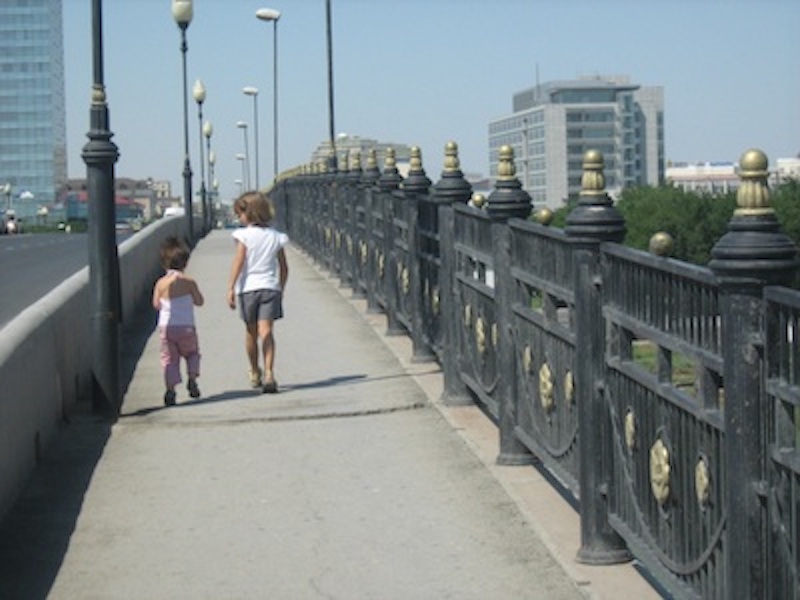
Bernadette is the beautiful mother of five wonderful children, among whom Mathilde, the eldest (15 and ½ years) has been diagnosed the Cornelia de Lange Syndrome and a chromosomic malformation (Isonomy 18). With her generosity and an open mind, Bernadette gives us a testimonial of rare depth that will certainly inspire other mothers and families in need of courage to launch themselves into the adventure of relocating with a child with special needs.
Can you explain to us what are Mathilde’s particular special care needs?
Mathilde is my first daughter. Even though I was a young and inexperienced mother, I quickly realized that something was wrong with her. She ate very slowly, not enough to grow. Even her small baby gestures made me suspect something.
At that time we were living in France. I had a hard time to find someone willing to listen to me and agree to take care of Mathilde. When I finally found him, I was already pregnant with my second child.
In the beginning Mathilde was diagnosed with the Cornelia de Lange Syndrome (https://ghr.nlm.nih.gov/). The prospects for the future were quite catastrophic. The doctor in charge was very direct in telling me that Mathilde would probably never walk or speak. I let you imagine how I felt, being pregnant with my second child. But I never lost courage. I always kept my spirit high, ready to fight to help my daughter achieve the best that she was capable of.
Have you felt that having been diagnosed the Cornelia de Lange Syndrome helped you in some way?
Honestly this Cornelia de Lange Syndrome did not tell me much, probably also because it was summarised to me in two words: nanisme and backwardness, and these words were of no help to me in the practicalities of daily life.
One day the Necker Hospital in Paris – that had taken Mathilde in charge – called me to tell me that Telethon had offered them a grant to do some research on the Cornelia de Lange Syndrome.
As an aside here, I want to emphasise the importance of Telethon and the benefits of the use of the funds they raise. Thanks to this grant the hospital has been able to advance in the research.
They did some blood tests, for which the analysis for this particular research costs 4,000 euros. At the end of all this, and after more genetic assessments that we underwent constantly, they found out that Mathilde was not affected by the Cornelia de Lange Syndrome but by a chromosomal malformation that is practically unique, and that they called Isonomy 18.
Because this malformation is virtually unknown, we don’t know much and no one can give us even an idea of Mathilde’s life expectancy. But in the end I tell myself that none of us knows when our time will come. What we do know is that Mathilde is extremely fragile, especially in her bones, and that she can get ill often and very seriously.
And hasn’t this prevented you from taking the decision to go and live abroad?
Never. I have never lost hope and especially the faith, and when we had a first possibility of relocation abroad, we did not hesitate in accepting it. We started in Pakistan, and we went on, with some periods in France, in the United States and now in Jerusalem.
How have you managed to organize Mathilde’s schooling in all of these changes of country?
When we went to Islamabad, Mathilde was 5, and she was accepted at the French school there. Unfortunately during our summer break in France we lost our fourth daughter, who was 13 months old, and when we went back to Pakistan I did not feel like getting in contact with the whole school community. These kinds of events make it difficult to interact with other parents, who don’t know how to talk to you or to approach you. My other children were attending a Pakistani school. The director told me that she had a section for children with special needs, and that she was ready to welcome Mathilde and her Cornelia de Lange Syndrome. The experience has been very positive, the school had plenty of programmes, they did orthophony, re-education, and I found this wonderful, especially considering what happened later in France.
Do you mean when you went back from Pakistan?
Yes, at that moment Mathilde received a school exclusion notice, that they justified with the fact that the school was not able to welcome a child with such needs. I won’t go into details about what this means to parents. It was thanks to the support of the municipality mayor, who knew our history and realized that it’s not everyday that families have to face experiences like ours, that Mathilde was integrated in school. She attended under special conditions that gave her nonetheless a frame of normality close to that of her sisters and brothers. She went to school every day until 11:30, and that allowed her to socialize a bit.
Then you were relocated to the United States. Do you find it easy to get information about the different countries in relation to an expatriation with children with special needs? How did you proceed about finding out what the process was and what was required of you ?
No, it isn’t easy at all, and there are no helpful informative sources. Obviously our decisions base themselves on the country that is proposed to us. Had I been told that our destination was Ivory Coast, for instance, I would have reacted differently. But even in California I had to learn through the hard way.
It must be said that in Los Angeles you choose the neighbourhood where you want to live according to the school you want your children to attend. We could not place ours in an expensive private school, so we opted for a neighbourhood with a good American public school. This school has immediately refused to take Mathilde, so I had no solution for her during the first period.
Until one day the mother of a child with special needs who went to the same school took me aside and explained to me that according to California law all schools are obliged to accept all children, even those with special needs. In a case where they can’t take care of these children, for instance because they lack the appropriate structures, they must find a solution in another school.
Once I got to know this, I was able to go back to the school and demand that they find a solution for Mathilde. Indeed she received a place in a school, like her brothers and sisters. The specialized school they gave her was pretty far from home, but was covering all expenditures, including transportation and meals.
And now in Israel… how is it going?
There is no comparison between the attitude of people in France towards these children and the one you see here. In Israel no one looks strangely at you when you walk with a child with special needs, and the attention Mathilde is granted at school plus the attitude of people around us have made her progress enormously.
Just to give you an example: when we were in the United States, she was twice severely ill, with a very serious form of pneumonia. Every time she falls ill, and particularly on this one time because it was very difficult to save her, she goes back to using the wheeling chair to move around.
When we went back to France after California, she was still using one, but nobody except members of her family made the least effort to motivate her to stand up and walk. No stimulation, no encouragement, nothing. Here in Jerusalem, despite the fact that medical exams have shown that her bone density has become worse, her bones don’t break and she progresses every day.
At school they make her do gardening, they taught her to cross the street! She takes the bus, she can go to buy small things in the shops, and the attitude towards her is encouraging. We had a meeting at her school, during which I spoke with absolutely everyone who deals with Mathilde, no one excluded. Everyone gave me their point of view, told me about their experience with her, what they think should or should not be done, etc.
Going back to the fact that Mathilde can often become ill, isn’t it stressful to have to rebuild a network of doctors and explain the whole story of her Cornelia de Lange Syndrome every time you move to a new country?
Yes, but you have to know that Mathilde is regularly followed by the Necker Hospital in Paris. Every time we go back, we have a meeting to make a new assessment. What is most important in the hosting country is to have a medical support in case of emergency. Every time I arrive at our new destination, my priority is to identify a good paediatrician who can follow Mathilde’s particular case.
What would you say to families of children with special needs who have to relocate abroad?
That they must never lose confidence. I also believe firmly in the strength of the family unit. I know that the situation is not always easy even for Mathilde’s brothers and sisters, but we are together and close, and this is how we manage to cope and to go ahead.




